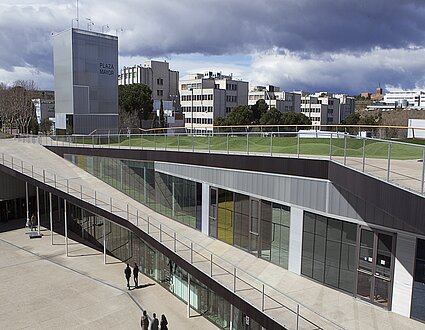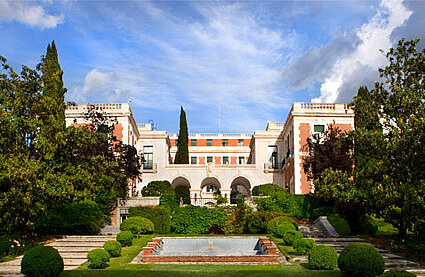Scientific environment
In addition to the cultural environment of the Spanish capital, the MIAS offers its residents a first-rate scientific environment, both at the Universidad Autónoma de Madrid and at Casa de Velázquez itself.
The Universidad Autónoma de Madrid, which was created in 1968 and stands in first place amongst spanish universities in the QS World University Ranking 2018/19, and in ninth place in the world ranking of universities that are less than 50 years old, has 32,345 students and 2,791 teaching and research staff, divided among 8 centres: faculties of Science, Philosophy and Arts, Psychology, Economics and Business Studies, Law, Medicine, Teacher training and Education. Located on the Cantoblanco Campus, the Faculty of Philosophy and Arts is part of the CSIC-UAM International Campus of Excellence (as designated by the Spanish Ministry of Education in 2009), of which the Humanities and Social and Legal Sciences are one of the four strategic pillars.
Affiliated to the University are a number of Institutes and Research Centres, all highly prestigious, dealing with specific fields of knowledge. These include:
- Centro de Estudios de Asia Oriental (Centre for East Asian Studies)
- Instituto de Ciencias de la Antigüedad (Institute of Sciences of Antiquity)
- Instituto de Estudios de la Mujer (Institute of Women's Studies)
- Instituto IMEDES (Migraciones, Etnicidad y Desarrollo Social) (Migrations, Ethnicity and Social Development)
- Instituto de Ciencias de la Educación (Institute of Education Sciences)
- Instituto de la Corte en Europa (Institute of Courts in Europe)
- Instituto DEMOS-PAZ (Human Rights, Democracy, Culture of Peace and Non-violence; recently founded).
Among the University's basic research tools are the physical and digital stocks in the UAM's Humanities Library and the materials available in the Cartoteca [Cartographic Library] and in the Library of the Instituto de la Mujer [Women's Institute] and the collections available in the libraries of Law, Economics, Psychology and Education.

For its part, Casa de Velázquez, which provisionally provides the residence for MIAS researchers only a few minutes from the centre of Madrid, is at once a research centre belonging to the network of five French Schools overseas under the aegis of the French Ministry of Higher Education and Research: the French School in Athens, the French School in Rome, the French Institute of Eastern Archaeology and the French Middle Eastern School.
Casa de Velázquez annually hosts researchers at the School of Advanced Hispanic and Iberian Studies (French acronym EHEHI), a place for training of young researchers and an international research centre in the domain of Human and Social Sciences. Casa de Velázquez operates a science policy focusing on the Iberian Peninsula, the Maghreb and Latin America (during the colonial and contemporary periods).
For the period 2017-2021 this policy is structured around three basic lines of research covering a broad time-scale from Antiquity to the present day:
- Cities, Citizenships, Territories
- Movements, Exchanges, Networks
- Heritages, Inheritance, Rewritings
These main thematic lines, which are cross-disciplinary, harness the main disciplines of the Human and Social Sciences (Archaeology, History, Geography, Literature, Sociology, Anthropology, Economics, Law…). They are divided into pluri-annual programmes founded on international cooperation. These programmes can benefit from funding by the Agence nationale de la recherche (French National Research Agency) or by European institutions.
Casa de Velázquez seeks, among other things, to serve as an incubator for innovative—and frequently highly specialised—projects. Every year more than 700 researchers from widely differing geographical environments take part in its activities.
Scientific policy of Casa de Velázquez







